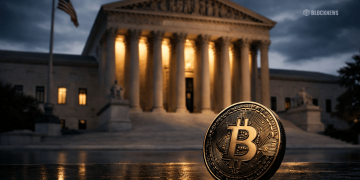- The US Federal Reserve is threatening to sue Bitcoin Magazine over merchandise that parodies the Fed’s FedNow payment system. Bitcoin Magazine claims the merchandise is protected free speech, while the Fed argues it infringes trademarks.
- The dispute centers around Bitcoin Magazine merchandise that criticizes FedNow’s surveillance capabilities and threats to civil liberties. The Fed says the merchandise misleads that an affiliation exists between the organizations.
- Bitcoin Magazine rejects the Fed’s cease-and-desist demand in an open letter, arguing the merchandise represents free speech commentary protected under the First Amendment. Bitcoin Magazine says it looks forward to defending its rights in court.
The US Federal Reserve is threatening legal action against Bitcoin Magazine over merchandise that parodies the Fed’s interbank payment system FedNow. Bitcoin Magazine believes the merchandise is protected free speech, while the Fed argues it infringes on trademarks.
Details of the Dispute
The dispute centers around Bitcoin Magazine merchandise featuring the FedNow name and logo. The items criticize the surveillance capabilities of FedNow and how it threatens civil liberties.
The Fed says Bitcoin Magazine is misleading readers into thinking an affiliation exists between the two organizations. Bitcoin Magazine claims fair use parody and argues the merchandise is free speech commentary on FedNow’s threat to freedom.
Bitcoin Magazine’s Response
In an open letter, Bitcoin Magazine rejects the Fed’s cease-and-desist demand. The letter argues the Fed has not built up goodwill through its policies, which have damaged the economy and caused high inflation.
Bitcoin Magazine states the merchandise makes clear its opposition to FedNow’s financial surveillance. The letter defends Bitcoin Magazine’s First Amendment rights and says it looks forward to defending them in court.
Conclusion
The dispute highlights the ideological differences between Bitcoin’s open system and the Fed’s centralized control. Bitcoin Magazine appears ready to fight for its free speech rights. The outcome of the case could impact protections for criticism of government policies.













